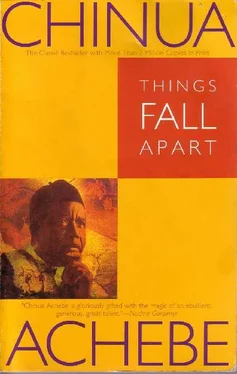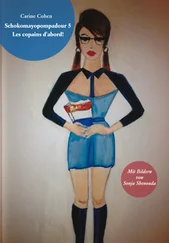Chinua Achebe - Things Fall Apart
Здесь есть возможность читать онлайн «Chinua Achebe - Things Fall Apart» весь текст электронной книги совершенно бесплатно (целиком полную версию без сокращений). В некоторых случаях можно слушать аудио, скачать через торрент в формате fb2 и присутствует краткое содержание. Город: New York, Год выпуска: 1994, Издательство: A DIVISION OF RANDOM HOUSE, INC., Жанр: Контркультура, на английском языке. Описание произведения, (предисловие) а так же отзывы посетителей доступны на портале библиотеки ЛибКат.
- Название:Things Fall Apart
- Автор:
- Издательство:A DIVISION OF RANDOM HOUSE, INC.
- Жанр:
- Год:1994
- Город:New York
- ISBN:нет данных
- Рейтинг книги:2 / 5. Голосов: 2
-
Избранное:Добавить в избранное
- Отзывы:
-
Ваша оценка:
- 40
- 1
- 2
- 3
- 4
- 5
Things Fall Apart: краткое содержание, описание и аннотация
Предлагаем к чтению аннотацию, описание, краткое содержание или предисловие (зависит от того, что написал сам автор книги «Things Fall Apart»). Если вы не нашли необходимую информацию о книге — напишите в комментариях, мы постараемся отыскать её.
—W. B. Yeats, "The Second Coming"
Things Fall Apart — читать онлайн бесплатно полную книгу (весь текст) целиком
Ниже представлен текст книги, разбитый по страницам. Система сохранения места последней прочитанной страницы, позволяет с удобством читать онлайн бесплатно книгу «Things Fall Apart», без необходимости каждый раз заново искать на чём Вы остановились. Поставьте закладку, и сможете в любой момент перейти на страницу, на которой закончили чтение.
Интервал:
Закладка:
The New Yam Festival was thus an occasion for joy throughout Umuofia. And every man whose arm was strong, as the Ibo people say, was expected to invite large numbers of guests from far and wide. Okonkwo always asked his wives' relations, and since he now had three wives his guests would make a fairly big crowd.
But somehow Okonkwo could never become as enthusiastic over feasts as most people. He was a good eater and he could drink one or two fairly big gourds of palm-wine. But he was always uncomfortable sitting around for days waiting for a feast or getting over it. He would be very much happier working on his farm.
The festival was now only three days away. Okonkwo's wives had scrubbed the walls and the huts with red earth until they reflected light. They had then drawn patterns on them in white, yellow and dark green. They then set about painting themselves with cam wood and drawing beautiful black pat terns on their stomachs and on their backs. The children were also decorated, expecially their hair, which was shaved in beautiful patterns. The three women talked excitedly about the relations who had been invited, and the children reveled in the thought of being spoiled by these visitors from the motherland. Ikemefuna was equally excited. The New Yam Festival seemed to him to be a much bigger event here than in his own village, a place which was already becoming remote and vague in his imagination.
And then the storm burst. Okonkwo, who had been walking about aimlessly in his compound in suppressed anger, suddenly found an outlet.
"Who killed this banana tree?" he asked.
A hush fell on the compound immediately.
"Who killed this tree? Or are you all deaf and dumb?"
As a matter of fact the tree was very much alive. Okonkwo's second wife had merely cut a few leaves off it to wrap some food, and she said so. Without further argument Okonkwo gave her a sound beating and left her and her only daughter weeping. Neither of the other wives dared to interfere beyond an occasional and tentative, "It is enough, Okonkwo," pleaded from a reasonable distance.
His anger thus satisfied, Okonkwo decided to go out hunting. He had an old rusty gun made by a clever blacksmith who had come to live in Umuofta long ago. But although Okonkwo was a great man whose prowess was universally acknowledged, he was not a hunter. In fact he had not killed a rat with his gun. And so when he called Ikemefuna to fetch his gun, the wife who had just been beaten murmured something about guns that never shot. Unfortunately for her Okonkwo heard it and ran madly into his room for the loaded gun, ran out again and aimed at her as she clambered over the dwarf wall of the barn. He pressed the trigger and there was a loud report accompanied by the wail of his wives and children. He threw down the gun and jumped into the barn and there lay the woman, very much shaken and frightened but quite unhurt. He heaved a heavy sigh and went away with the gun.
In spite of this incident the New Yam Festival was celebrated with great joy in Okonkwo's household. Early that morning as he offered a sacrifice of new V™ and P^'011'° h,s ancestors he asked them to protect him, his children and I heir mothers in the new year.
As the day wore on his in-laws arrived from three sur-.ounding villages, and each party brought with them a huge ,,ot of palm-wine. And there was eating and drinking td…Kht, when Okonkwo's in-laws began to leave for the,r
110111 The second day of the new year was the day of the great wrestling match between Okonkwo's village and their neighbors. It was difficult to say which the people enjoyed more,he feasting and fellowship of the first day or the wresthng Contest of the second. But there was one woman who had no doubt whatever in her mind. She was Okonkwo'ssecond wife Ekwcfi, whom he nearly shot. There was no festival in all the K-nsons of the year which gave her as much pleasure as the wrestling match. Many years ago when she was the village br,u,ty Okonkwo had won her heart by throwing the Cat , tl,r greatest contest within living memory. She did not marry him then because he was too poor to pay her bride-price. But a few years later she ran away from her husband and came to live with Okonkwo. All this happened many years ago. Now Ekwefl was a woman of forty-five who had suffered a great deal in her time. But her love of wrestling contests was still as strong as it was thirty years ago.
It was not yet noon on the second day of the New Yam Festival. Ekwefi and her only daughter, Ezinma, sat near the fireplace waiting for the water in the pot to boil. The fowl Ekwefi had just killed was in the wooden mortar. The water began to boil, and in one deft movement she lifted the pot from the fire and poured the boiling water over the fowl. She put back the empty pot on the circular pad in the corner, and looked at her palms, which were black with soot. Ezinma was always surprised that her mother could lift a pot from the fire with her bare hands.
"Ekwefi," she said, "is it true that when people are grown up, fire does not burn them?" Ezinma, unlike most children, called her mother by her name.
"Yes," replied Ekwefi, too busy to argue. Her daughter was only ten years old but she was wiser than her years.
"But Nwoye's mother dropped her pot of hot soup the other day and it broke on the floor."
Ekwefi turned the hen over in the mortar and began to pluck the feathers.
"Ekwefi," said Ezinma, who had joined in plucking the feathers, "my eyelid is twitching."
"It means you are going to cry," said her mother.
"No," Ezinma said, "it is this eyelid, the top one."
"•";' "That means you will see something."
"What will I see?" she asked.
"How can I know?" Ekwefi wanted her to work it out herself.
"Oho," said Ezinma at last. "I know what it is—the wrestling match."
At last the hen was plucked clean. Ekwefi tried to pull out the horny beak but it was too hard. She turned round on her low stool and put the beak in the fire for a few moments. She pulled again and it came off.
"Ekwefi!" a voice called from one of the other huts. It was Nwoye's mother, Okonkwo's first wife.
"Is that me?" Ekwefi called back. That was the way people answered calls from outside. They never answered yes for fear it might be an evil spirit calling.
"Will you give Ezinma some fire to bring to me?" Her own children and Ikemefuna had gone to the stream.
Ekwefi put a few live coals into a piece of broken pot and Ezinma carried it across the clean swept compound to Nwoye's mother.
"Thank you, Nma," she said. She was peeling new yams, and in a basket beside her were green vegetables and beans.
"Let me make the fire for you," Ezinma offered.
"Thank you, Ezigbo," she said. She often called her Ezigbo, which means "the good one."
Ezinma went outside and brought some sticks from a huge bundle of firewood. She broke them into little pieces across the sole of her foot and began to build a fire, blowing it with her breath.
"You will blow your eyes out," said Nwoye's mother, looking up from the yams she was peeling. "Use the fan." She stood up and pulled out the fan which was fastened into one of the rafters. As soon as she got up, the troublesome nan-nygoat, which had been dutifully eating yam peelings, dug her teeth into the real thing, scooped out two mouthfuls and fled from the hut to chew the cud in the goats' shed. Nwoye's mother swore at her and settled down again to her peeling. Ezinma's fire was now sending up thick clouds of smoke. She went on fanning it until it burst into flames. Nwoye's mother thanked her and she went back to her mother's hut.
Just then the distant beating of drums began to reach them. It came from the direction of the ilo , the village playground. Every village had its own ilo which was as old as the village itself and where all the great ceremonies and dances took place/The drums beat the unmistakable wrestling dance—quick, light and gay, and it came floating on the wind.
Читать дальшеИнтервал:
Закладка:
Похожие книги на «Things Fall Apart»
Представляем Вашему вниманию похожие книги на «Things Fall Apart» списком для выбора. Мы отобрали схожую по названию и смыслу литературу в надежде предоставить читателям больше вариантов отыскать новые, интересные, ещё непрочитанные произведения.
Обсуждение, отзывы о книге «Things Fall Apart» и просто собственные мнения читателей. Оставьте ваши комментарии, напишите, что Вы думаете о произведении, его смысле или главных героях. Укажите что конкретно понравилось, а что нет, и почему Вы так считаете.












